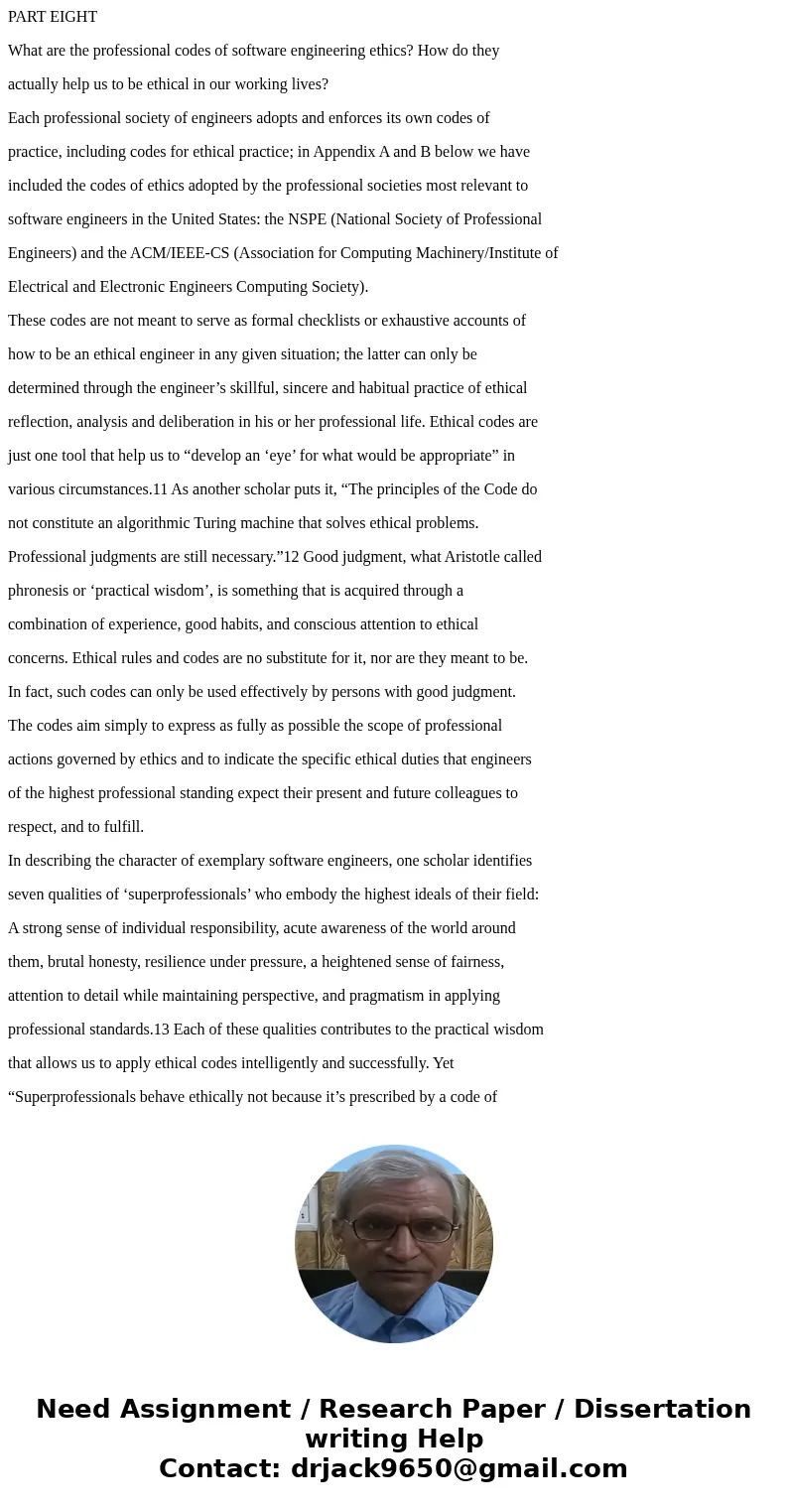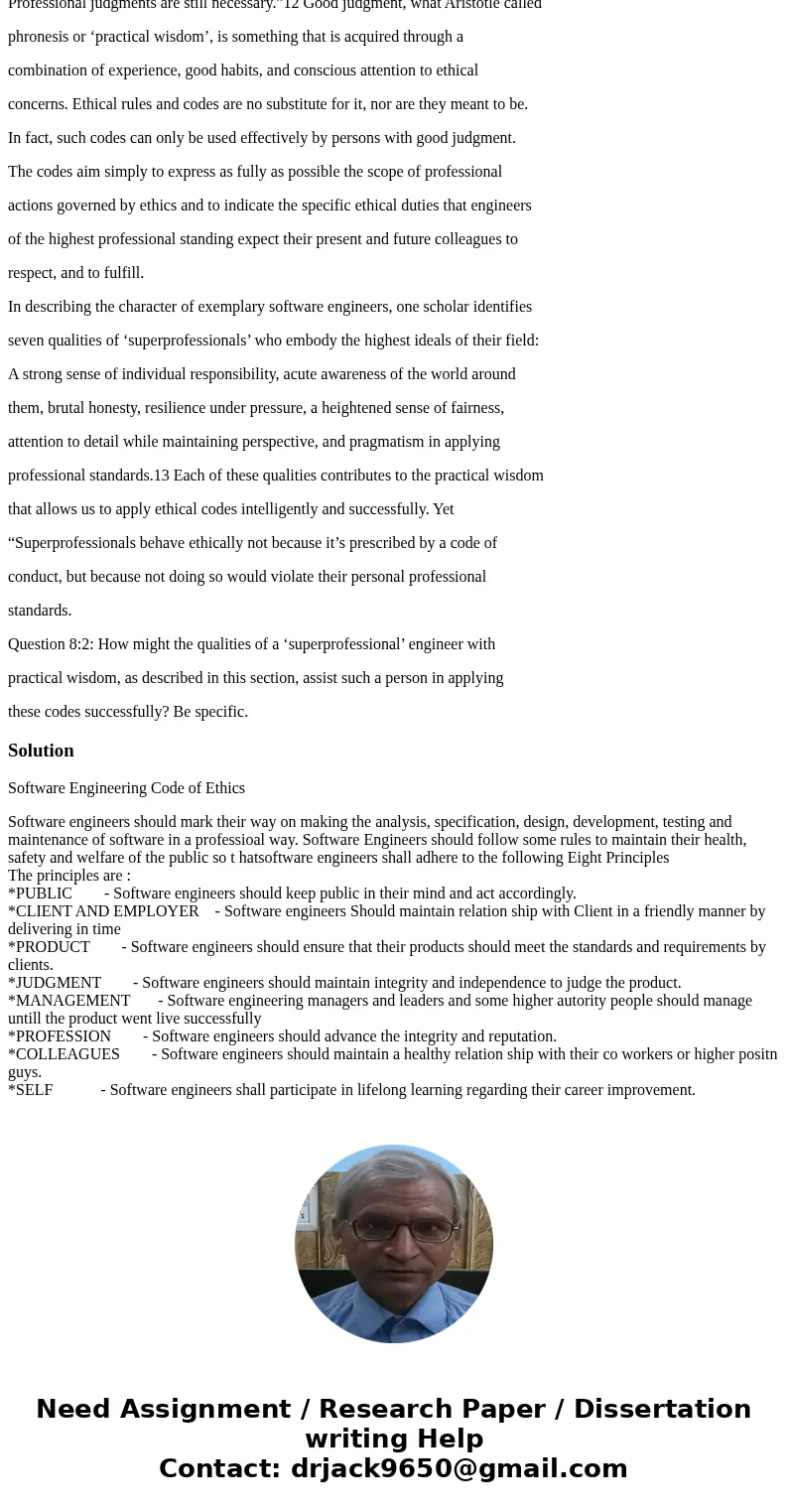PART EIGHT What are the professional codes of software engin
PART EIGHT
What are the professional codes of software engineering ethics? How do they
actually help us to be ethical in our working lives?
Each professional society of engineers adopts and enforces its own codes of
practice, including codes for ethical practice; in Appendix A and B below we have
included the codes of ethics adopted by the professional societies most relevant to
software engineers in the United States: the NSPE (National Society of Professional
Engineers) and the ACM/IEEE-CS (Association for Computing Machinery/Institute of
Electrical and Electronic Engineers Computing Society).
These codes are not meant to serve as formal checklists or exhaustive accounts of
how to be an ethical engineer in any given situation; the latter can only be
determined through the engineer’s skillful, sincere and habitual practice of ethical
reflection, analysis and deliberation in his or her professional life. Ethical codes are
just one tool that help us to “develop an ‘eye’ for what would be appropriate” in
various circumstances.11 As another scholar puts it, “The principles of the Code do
not constitute an algorithmic Turing machine that solves ethical problems.
Professional judgments are still necessary.”12 Good judgment, what Aristotle called
phronesis or ‘practical wisdom’, is something that is acquired through a
combination of experience, good habits, and conscious attention to ethical
concerns. Ethical rules and codes are no substitute for it, nor are they meant to be.
In fact, such codes can only be used effectively by persons with good judgment.
The codes aim simply to express as fully as possible the scope of professional
actions governed by ethics and to indicate the specific ethical duties that engineers
of the highest professional standing expect their present and future colleagues to
respect, and to fulfill.
In describing the character of exemplary software engineers, one scholar identifies
seven qualities of ‘superprofessionals’ who embody the highest ideals of their field:
A strong sense of individual responsibility, acute awareness of the world around
them, brutal honesty, resilience under pressure, a heightened sense of fairness,
attention to detail while maintaining perspective, and pragmatism in applying
professional standards.13 Each of these qualities contributes to the practical wisdom
that allows us to apply ethical codes intelligently and successfully. Yet
“Superprofessionals behave ethically not because it’s prescribed by a code of
conduct, but because not doing so would violate their personal professional
standards.
Question 8:2: How might the qualities of a ‘superprofessional’ engineer with
practical wisdom, as described in this section, assist such a person in applying
these codes successfully? Be specific.
Solution
Software Engineering Code of Ethics
Software engineers should mark their way on making the analysis, specification, design, development, testing and maintenance of software in a professioal way. Software Engineers should follow some rules to maintain their health, safety and welfare of the public so t hatsoftware engineers shall adhere to the following Eight Principles
The principles are :
*PUBLIC - Software engineers should keep public in their mind and act accordingly.
*CLIENT AND EMPLOYER - Software engineers Should maintain relation ship with Client in a friendly manner by delivering in time
*PRODUCT - Software engineers should ensure that their products should meet the standards and requirements by clients.
*JUDGMENT - Software engineers should maintain integrity and independence to judge the product.
*MANAGEMENT - Software engineering managers and leaders and some higher autority people should manage untill the product went live successfully
*PROFESSION - Software engineers should advance the integrity and reputation.
*COLLEAGUES - Software engineers should maintain a healthy relation ship with their co workers or higher positn guys.
*SELF - Software engineers shall participate in lifelong learning regarding their career improvement.


 Homework Sourse
Homework Sourse